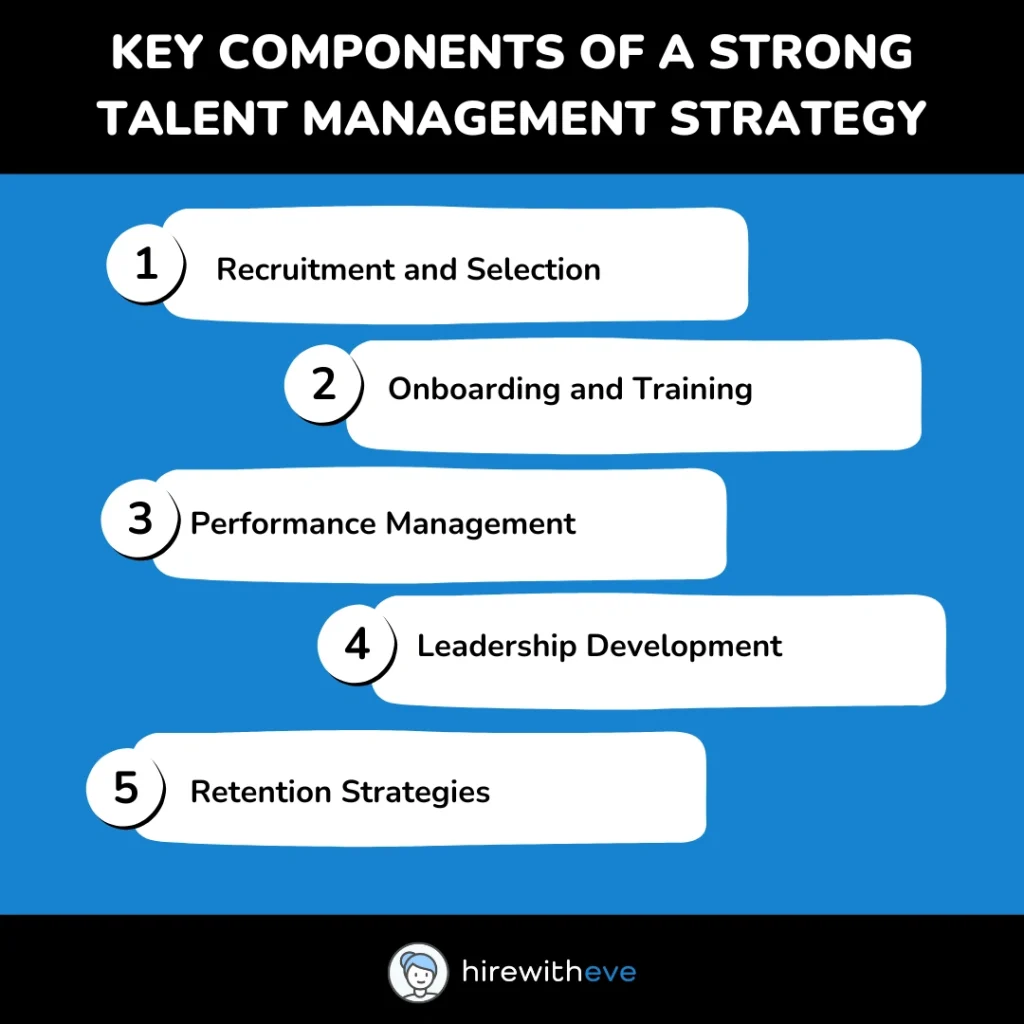Business Case for Talent Management: Why It Matters for Every Organization

The concept of talent management has become essential in today’s competitive business landscape. As organizations strive to attract, develop, and retain top talent, the need for a solid business case for talent management has never been more apparent. Talent management goes beyond simply filling positions — it is a strategic approach to ensure the right people are in the right roles, contributing to organizational success.
This blog will explore the business case for talent management, examining its significance, benefits, and how HR professionals can implement effective talent management strategies in their organizations.
The Importance of Talent Management
Talent management is not just about recruitment—it’s a comprehensive strategy that includes hiring, onboarding, development, and retention.
Building a robust business case for talent management involves understanding the long-term benefits of investing in people. Effective talent management leads to:
Enhanced employee engagement and satisfaction.
Improved retention rates, reducing turnover costs.
Stronger leadership pipelines.
A culture of continuous learning and development.
For talent acquisition specialists and HR managers, making a business case for talent management is essential when advocating for the resources and tools required to implement these strategies. Without a clear plan for managing talent, organizations risk losing their competitive edge, experiencing high turnover rates, and struggling with employee disengagement.
What are the Key Components of a Strong Talent Management Strategy?
To build a successful business case for talent management, HR professionals need to focus on several core components that drive talent success. These include:

Recruitment and Selection: Finding the right candidates who not only possess the necessary skills but also align with the company’s values is critical. A comprehensive talent management strategy ensures a steady pipeline of qualified candidates, making the business case for talent management easier to justify.
Onboarding and Training: Effective onboarding sets the tone for an employee’s future with the company. A clear business case for talent management must include a well-structured onboarding process that acclimates new hires quickly and effectively. Ongoing training and development further strengthen this case by ensuring employees stay engaged and grow within the organization.
Performance Management: Regular feedback, clear performance metrics, and growth opportunities are essential to retaining top talent. When presenting the business case for talent management, it’s important to highlight how structured performance management processes contribute to employee success and organizational goals.
Leadership Development: Preparing future leaders from within the organization is another critical aspect of talent management. A strong business case for talent management should include leadership development programs that help identify and groom employees with leadership potential.
Retention Strategies: The cost of turnover can be significant, both in terms of direct expenses and the impact on team morale. Building a business case for talent management means implementing retention strategies such as competitive compensation, work-life balance initiatives, and career advancement opportunities.
Business Case for Talent Management: Proven Benefits
Creating a compelling business case for talent management involves highlighting the tangible benefits that an organization can expect from investing in its people. Some of the proven benefits include:
Increased Productivity: Employees who are well-managed and have access to growth opportunities are more productive. When you make the business case for talent management, it’s essential to show how an effective talent management strategy leads to higher employee productivity and overall business performance.
Reduced Turnover: High turnover can be costly, with expenses related to recruitment, training, and lost productivity. A strong business case for talent management demonstrates how focusing on retention reduces turnover and saves the company money in the long run.
Better Employee Engagement: Engaged employees are more likely to be productive, stay with the company longer, and contribute positively to the work environment. A clear business case for talent management should highlight the link between effective management and employee engagement.
Enhanced Employer Branding: Companies known for their strong talent management practices attract top talent. When making the business case for talent management, HR managers can demonstrate how a good reputation as an employer of choice helps the company stand out in the market.
Survey and Industry Insights
Recent industry surveys reinforce the importance of talent management in building a successful organization. According to a study by the Society for Human Resource Management (SHRM), 75% of employees cited a lack of growth opportunities as a key reason for leaving their jobs. This statistic underscores the business case for talent management, emphasizing the need for organizations to invest in employee development and retention strategies.
Furthermore, a report by Deloitte found that organizations with effective talent management strategies are 2.5 times more likely to outperform their competitors. This statistic highlights the direct link between talent management and business success, making the business case for talent management even stronger.
Conclusion
In conclusion, the business case for talent management is clear: organizations that prioritize managing their talent effectively reap numerous benefits, from increased productivity to reduced turnover. For HR managers and talent acquisition specialists, building this case involves demonstrating how investing in employees leads to better business outcomes.
When considering the tools needed to support these efforts, platforms like HirewithEve.ai offer invaluable features that align with effective talent management strategies. Here’s how HirewithEve.ai can help:
Skills-Based Hiring: The platform’s focus on skills-based hiring ensures that organizations attract the right candidates who fit the job requirements, making the business case for talent management easier to justify by ensuring quality hires from the start.
Remote Work Capabilities: HirewithEve.ai enables companies to expand their talent pool globally by offering robust remote hiring features. This aligns with the business case for talent management by giving organizations access to the best talent, regardless of location.
Data-Driven Insights: HirewithEve.ai provides analytics that helps HR professionals track key performance metrics, ensuring that their talent management strategies are effective. These insights are crucial for demonstrating the business case for talent management in terms of measurable business impact.
By leveraging the features of HirewithEve.ai, organizations can strengthen their talent management strategies and ensure they are prepared for future workforce challenges. Ultimately, building a strong business case for talent management is about showing how investing in people leads to better business outcomes — something HirewithEve.ai is designed to support.
